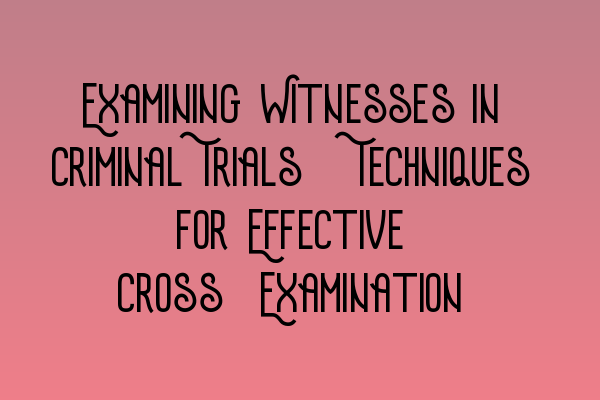Examining Witnesses in Criminal Trials: Techniques for Effective Cross-Examination
As a criminal law practitioner, it is crucial to possess strong skills in examining witnesses during criminal trials. Cross-examination plays a fundamental role in challenging witness credibility and presenting your case effectively. In this article, we will explore some techniques for conducting an effective cross-examination that can greatly impact the outcome of a criminal trial.
1. Prepare Thoroughly
The first step to any successful cross-examination is thorough preparation. Familiarize yourself with the witness statements, evidence, and case facts. This preparation will enable you to uncover any inconsistencies or contradictions in the witness’s testimony. Additionally, it’s essential to have a clear understanding of the relevant legal principles related to the case. By being well-prepared, you can confidently and strategically question the witness to reveal the truth.
2. Establish Credibility
Establishing credibility is crucial when examining witnesses in criminal trials. Jurors are more likely to trust witnesses who appear reliable and truthful. Begin by asking the witness questions that are relatively straightforward and uncontroversial. This approach helps build rapport and allows the witness to feel comfortable. Additionally, maintain a respectful tone and avoid confrontational tactics that may create a negative impression.
3. Use Leading Questions
Leading questions are a powerful tool during cross-examination. By phrasing questions in a way that suggests the expected answer, you can guide the witness and control the direction of their testimony. Utilize leading questions to highlight inconsistencies, challenge the witness’s memory, or extract information that supports your case. However, it’s important to be mindful of the court’s rules on leading questions to avoid objections from opposing counsel.
4. Listen Attentively
Active listening is a crucial skill during cross-examination. Pay close attention to the witness’s answers and body language. Look for hesitation, nervousness, or signs of deception. By noting these cues, you can target specific areas for further questioning. Moreover, actively listening allows you to adapt your strategy in real-time as the witness’s testimony unfolds.
5. Maintain Control
It’s essential to maintain control of the cross-examination to maximize its effectiveness. Avoid allowing the witness to go off-topic or to provide lengthy answers that may confuse or divert the jury’s attention. Politely interrupt if the witness is evading or not directly answering the question. By staying focused and assertive, you can guide the witness through your intended line of questioning.
6. Tailor Questions to the Jury
Consider the composition of the jury and tailor your questions accordingly. Use language and concepts that resonate with the jurors’ backgrounds and experiences. This approach helps the jury understand complex legal concepts and enhances their comprehension of your case. Crafting questions that relate directly to the jurors’ perspectives can significantly impact their evaluation of witness credibility and the overall strength of your argument.
7. Use Impeachment Techniques
Impeachment techniques are employed to challenge the credibility of a witness. These techniques involve introducing prior statements, inconsistencies, or other evidence that contradicts the witness’s current testimony. Impeachment can be a powerful tool to establish a motive for the witness to lie or to cast doubt on their reliability. However, it is crucial to ensure that the evidence you introduce adheres to the rules of admissibility.
8. Stay Calm and Confident
During cross-examination, it’s important to remain calm and confident. Your demeanor can significantly influence the jury’s perception of your credibility and the strength of your case. Maintain a professional and composed presence, even in the face of unexpected responses or aggressive tactics from opposing counsel. This poise will help you effectively navigate the cross-examination process and maintain control of the courtroom.
Conclusion
Cross-examination is a crucial component of criminal trials, and mastering effective techniques can greatly impact the outcome of your case. Through thorough preparation, establishing credibility, using leading questions, active listening, maintaining control, tailoring questions to the jury, employing impeachment techniques, and demonstrating calmness and confidence, you can conduct an effective cross-examination that highlights the weaknesses in the witness’s testimony and strengthens your case.
For further professional development in criminal practice, consider attending our Workshops and Seminars on Criminal Practice: Expanding Your Expertise. Stay informed about the latest updates in UK criminal laws by reading our article on Updates in UK Criminal Laws: Staying Informed and Prepared. Enhance your SQE criminal law study group experience to strengthen your knowledge and skills by reading our article on Enhancing Your SQE Criminal Law Study Group Experience. For a detailed analysis of criminal evidence rules, check out our article on Decoding Criminal Evidence Rules: A Detailed Analysis. Lastly, if you are interested in diving deep into fraud and financial crimes in the UK, read our article on Deep Dive into Fraud and Financial Crimes in the UK.
